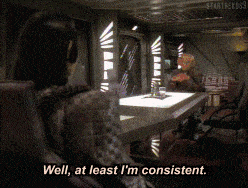
17 dicas de entrevista para entrevistadores

The modern job interview, as old as it is, hasn’t changed much considering modern technological advances. Some actionable interviewing tips for interviewers are just the thing to bring your process up to date.
Nowadays, the interview itself can happen between two people on opposite sides of the planet, but the dynamics and process stay the same. Modern recruitment interviews are now more planned and calculated. With the mounting costs of a bad hire on the line, interviews now need to be consistent and reliable.
So whether you’d like to bring your interview techniques up to speed or create a new interview process from scratch, you’re in the right place.
Here are 17 interviewing tips for interviewers that you can use
In this article, you’ll see:
- Interviewing tips for interviewers
- How to make candidates an engaged part of your interview
- The role that a defined and consistent interview process plays.
So let’s get stuck into it.
Interviewing tip #1 – Inspire curiosity
In an industry where it’s growing ever harder to find quality developer skills, many jobs go unfilled. Therefore, any applicant you do get you need to keep interested in the available position. This sounds a little counterintuitive at first – you, the recruiter, keeping the interest of the applicant?
Well, if you manage to find some ideal talent, or are trying to headhunt from another company, you have no choice! Once you have your high-end talent in an interview, keep them intrigued by presenting the things that make your workplace unique and a good place to work. Do this by mentioning challenges that employees in similar roles usually face, as well as future plans for the business.
Interviewing tip #2 – Learn about your candidate
This one is pretty simple, but it’s crucial to make your candidate feel comfortable. And, well, to not make a fool of yourself. If necessary, check out the LinkedIn profile of your candidate to see if it’s regularly updated and assess any info that wasn’t on their initial application. Other social accounts can help give you a good idea of the individual, but remember that many individuals consider Facebook, Twitter, and Instagram as a personal social media website. and make a mental note of anything worth bringing up in the interview.

Interviewing tip #3 – Watch their body language
Actions speak louder than words. So keeping an eye on a candidate’s body language can tell you a lot. A lack of eye contact can mean the individual isn’t overly confident – not ideal if the position on offer is a managerial role. Eye contact at the right moment, facing you front on and a generally ‘open’ posture can show that your candidate has a genuine interest in you and what you’re saying.
Other positive things to keep an eye on in an interview:
- Nodding or tilting one’s head forward, indicating agreement, interest or at least that they’re paying attention,
- Mirroring body language, such as by crossing hands when you cross your legs,
- Positive verbal responses, such as repeating similar phrases.
Also keep in mind that just because a candidate doesn’t interview well, doesn’t mean they’re unable to do the job properly. Nerves don’t always bring out the best of people.
Interviewing tip #4 – Watch your own body language
The same above rules about body language apply for you. Non-verbal communication works both ways.
 Image source: Photo by mentatdgtfrom Pexels
Image source: Photo by mentatdgtfrom Pexels
If you’re distracted and not giving your full attention to the candidate, that will show and ultimately have an effect on the interview.
- Spending too much time reading an applicant’s CV or application shows that you haven’t done your research and you’re not overly interested.
- Speeding up the pace of the interview can make you come off as uninterested as if you’re wasting your time,
- Being overly professional, like not smiling or reacting to jokes can make you and the company come across as cold and unwelcoming.
Interviewing tip #5 – You’re in control, but don’t talk down.
It’s crucial that you make your candidate feel warmed and welcomed in the interview. They’re there to learn as much about the company and position, as you are to learn about them.
Being overly dominant and talking down to a candidate by questioning irrelevant things too much and really make a candidate feel uncomfortable and lose interest. You’re in complete control of the interview, yes, but use that power to get the best possible information from the candidate, not overpower them.
Interviewing tip #6 – Silence can be golden
Silence can be an effortless means to solicit important information and make valuable observations of the candidate’s personality during an interview. The rule of thumb is to not be the next person to speak after you ask a question. While the silence may be deafening, you give the interviewee a real chance of answering it, without robbing the question of its power.
The next time to use this tool is after the candidate has answered your question. Once they finish replying, by pausing momentarily for 2 or 3 seconds, they may decide to share some other piece of information with you, in an effort to combat the silence’s awkwardness. Either way, it is a harmless and risk-free technique that gives an extra edge to your interviewing style.
Interviewing tip #7 – Use behavioral and situation-based questions.
Behavioral e situational-based questions evaluate a candidate’s past experiences and behaviors in order to determine their potential and/or future actions.
Behavioral based questions reveal a lot about the way a candidate thinks and behaves in order to solve a certain problem. On the other side of the coin, situational based interview questions reveal more about the way a candidate has acted or would act, in a given situation.
Example of a behavioral question:
Tell me about a time that you had two projects with conflicting deadlines.
In the above example, there’s no mention of time management or prioritizing work, but a candidate’s response to this question can give you a load of information.
Interviewing tip #8 – Listen hard
Quality listening skills are an overlooked asset of many HR recruiters and employees in general.
Being a good listener helps your candidate feel relaxed and speak about themselves in a more honest and revealing manner. This happens because your candidate knows that you have their undivided attention and are giving them the stage to speak about themselves. When your candidate is more comfortable, they’re going to give you more detailed and concise information than if you’re rushing them to speak.
 Interviewing tip #9 – Use the 80/20 rule
Interviewing tip #9 – Use the 80/20 rule
The 80/20 rule is a great basis for communicating while learning. Conventional wisdom says that the candidate should do the majority of the talking during an interview. 20% of the conversation is for you to ask questions and clarify the candidate’s responses.
Why?
By giving the candidate 80% of the conversation and providing an environment for them to comfortably talk about themselves, you learn more about them. The overall result is that you hire a developer that has the skills to problem solve and show initiative, rather than a developer who can please you and knows when to laugh at your jokes.
Interviewing tip #10 – Keep the interview flexible
It’s crucial that your interview has a structure, but not structured to the point that it’s not flexible. Flexibility in a conversation is simply part of being a good conversationalist.
Run with the conversation if it goes off topic. This is a natural, organic way to converse with a human, which is an element that you obviously want to keep part of your job interview! If the conversation goes from the difficulties of working with JavaScript to the football game on the weekend, just go with it for a little.
It’s important that you go with the flow if you go off topic, but not too far…
Interviewing tip #11 – Stay relevant and appropriate
To expand on the previous point, it’s crucial you don’t go too far off topic or go off topic for too long.
You only have limited time in your interview to exchange information, so it’s crucial that you don’t suck up too much time talking off topic. If the conversation does go off topic, run with it, but remember to bring it back on topic sooner rather than later.
Interviewing tip #12 – Avoid unconscious bias
We’re naturally biased to a lot of things. That’s why we prefer the ‘vibe’ of one over another. We naturally trust our intuition, and there’s nothing wrong with that. But all too often, we don’t know we’re trusting our intuition, as we’re doing it on a subconscious level. For this reason, you need to be aware of your unconscious bias in the recruiting process. Gender, cultural and ethnic bias can make you overlook some of the most talented candidates in ways that you didn’t even know you were doing so. But be aware that you’re doing so is the first step to stamping it out.
Interviewing tip #13 – Apply a similar interview to all candidates
Consistency throughout the hiring process will give you a good baseline to compare all candidates against. Putting the same questions to each candidate means that you’ll be able to assess each candidate’s answers to the same question and put everyone on the same playing field, so to say. Furthermore, this is a more efficient use of your time. You can easily apply the same template to each candidate rather than spend time creating something unique for everyone.
 Interviewing tip #14 – Exchange information
Interviewing tip #14 – Exchange information
Once you’ve got your interview method down pat, it can be easy to fall into a routine and give each interview a ‘cookie cutter’ kind of feeling. This, obviously, is not a good thing. Be sure that each and every interview, you’re exchanging information by informing the candidate about the position, and learning more about your applicant. Don’t simply ask questions for the sake of asking them.
Interviewing tip #15 – Switch it up a little
From time to time, try rewriting questions in a different manner. Try asking a behavioral based question, and then in the next interview, rephrase that question. For example, in one interview ask ‘Describe how you would prioritize, organize and track your work’. In the next interview for the same position, ask a simplified version, ‘How do you manage your workload?’.
This is essentially the same question, just written in a different way, but both answers need a clear and concise answer. One question implies that a detailed answer is needed and the other doesn’t. Asking questions in a manner like this can help see if your candidate can show initiative.
Interviewing tip #16 – Make time
You lead a busy work life, this is something you knew when you started your career as an HR recruiter. And, as an HR manager, there’s a lot you need to take care of, regardless of the size of your company. But it’s important that you allocate the necessary time to hold your interviews.
Allocate a good 10-15 minutes either side of your interview periods to prepare and digest what you’ve just learned. Don’t rush into an interview at the last minute because you got distracted emailing the finance department. Being able to digest information is a crucial step toward making the right decision.
Interviewing tip #17 – Tell them what to expect next
At the onset and conclusion of your interview, explain the recruitment process to the candidate. No matter how simple or complex your interview process is, it’s important that your candidate knows how your recruitment ecosystem functions. At the end of the interview, tell your candidate when they’ll hear from you again. The next step is simple but overlooked all too often.
Email your candidate. Whether you want to move them through your recruitment pipeline or they’re not a fit for the position, tell them.
Whether it’s in the world of dating or in professional recruiting, ghosting an individual is never a smart move. Be a professional.
Conclusão
Whether you’re a seasoned recruiter or just starting your career, this handful of interviewing tips can help improve your recruitment process. In summary, you’ll never go wrong if you’re open, easy-going, and give your candidate the stage to talk about themselves. Most of them are common sense but overlooked as we’re too laser-focused on the finer points of creating a recruitment process.
So now may be the perfect time for you to take stock, assess your interview process and see how you can improve it using the above-mentioned tips.
For more information to help you give amazing interviews, check out some of our other posts on the subject.




